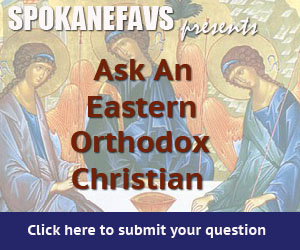What would you like to know about the Eastern Orthodox Christian faith? Submit your question.
Jesus Christ, we are told is the only begotten of the father. Also, the Holy Spirit proceeds from the father. Does this indicate that at some point in the past God was not triune?

Persons of the Trinity have always existed before time and yet act within time, moving and speaking within our history. God implies the Trinity, God the Father, God the Son, and God the Holy Spirit. God reveals himself to us in this paradoxical belief.
“To try to comprehend unbegottenness of the Father, begottenness of the Son, or procession of the Holy Spirit, would lead to insanity,” Gregory the Theologian said.
The Eastern Orthodox Church approaches God apophatically, being content to encounter God personally and yet realize the inability of man’s intellect to understand and comprehend the God’s existence.
An analogy that comes to mind, we are creators of many things in this world, however we are not a part of those creations, but we exist outside of those objects created.
So when we ask the question, “Was there ever a point in time that God was not triune?” we are asking a question within the confines of our finite existence about an Entity that is infinite in existence, forever and always the same, without beginning and without end.
Revelation 1:8 says “’I am the Alpha and the Omega,’ says the Lord God, ‘Who is, Who was, and Who is to come, the Almighty.’” If God were subject to space, time, and matter, then God would be limited and finite, and therefore not God.
The Eastern Orthodox Church maintains that the Trinity of Persons that exist in the Christian Godhead are as follows: three co-equal Persons; of the same substance; each One dwelling in the Other by an unceasing movement of mutual love; and yet all three Persons mystically undivided, Trinity in one essence.
Where ever One of the Persons of the Trinity is, it is there you will find the Other Two (a mystery). John 14:20 says “At that day you will know that I am in My Father, and you in Me, and I in you.” The Christian God is not just a unit, but a union, not just unity but community.









Thank you Nicholas, a very good explanation.
I particularly enjoyed the Gregory quote. I had read that very oration just two weeks ago. While we Catholics and Orthodox have some work to do (to say the least) concerning the fillioque issue, for everything written above the Catholic Church would be in complete agreement.
– Fr. Curtis Seidel